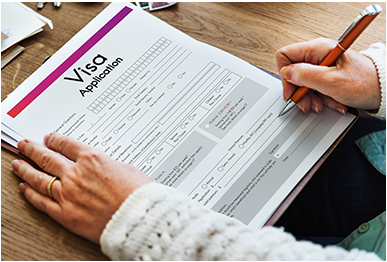Why Study in Canada ?
Academic Excellence
The most popular programs among Indian students seeking higher education opportunities in Canada are Computer Science, Business Administration, Engineering, Health Sciences, Information Technology, Biosciences, Medicine, and Healthcare, Media and Journalism, Agricultural Science and Forestry.
Quality Education
Short Duration Of Courses
Explore Canada During Studies
Health Benefits For Students
Popular courses in Canada that are being opted by students
Student Visa Canada
 International students planning to study in Canada have three intakes to choose from for the start their academic programs.
International students planning to study in Canada have three intakes to choose from for the start their academic programs.
- Fall Intake in September: The Fall intake is considered the primary intake for most universities and colleges in Canada. Most courses and programs are available during the Fall intake.
- Winter Intake in January: The Winter intake is smaller and less common than the Fall intake. It is ideal for students who missed the Fall intake or needed more time to prepare.
- Summer Intake in May/June: Summer intake is the lease preferred compared to Fall and Winter. Summer intake is offered by universities and colleges only for specific programs.
 | Studying in Canada is affordable for international students compare to many countries. Tuition Fees: The average tuition cost for international students in Canada is approximately CAD 20,000 to CAD 30,000 per year. Living Expenses: The average living cost for international students in Canada is around CAD 15,000 per year including accommodation, food, transportation, health insurance, and other personal expenses. International students should explore scholarship opportunities to manage their costs. |
 |
There are several scholarships available to Indian students aspiring to study in Canada, which can help alleviate the financial burden of international education. These scholarships are offered by various organizations, including the Canadian government, educational institutions, and private foundations. Non-Governmental Scholarships: Various non-governmental organizations, foundations, and corporations offer merit-based or need-based scholarships targeted toward specific fields of study or demographic groups. Institutional Scholarships: Many Canadian universities and colleges offer scholarships specifically designed for international students, including those from India. These may be based on academic excellence, extracurricular achievements, or other criteria. |
Study in Canada ScholarshipsThe Study in Canada Scholarships provide students from post-secondary institutions located in select countries/territories in Asia, Europe, the Middle East and North Africa, and Sub-Saharan Africa with short-term exchange opportunities for study or research in Canadian post-secondary institutions at the college, undergraduate and graduate levels.Banting Postdoctoral Fellowships programThe Banting Postdoctoral Fellowships program provides funding to the very best postdoctoral applicants, both nationally and internationally, who will positively contribute to the country’s economic, social, and research-based growth. For more detailed information about these scholarships and how to apply consult our counsellors |
 Indian student planning to study in Canada, must comply with certain key admission requirements:
Indian student planning to study in Canada, must comply with certain key admission requirements:
- Academic Qualifications:
- English Language Proficiency:
- Acceptance Letter:
- Financial Proof:
- Health and Security Requirements:
- Study Permit Application:
 |
The process for obtaining a student visa to study in Canada for Indian students involves several steps.
Step 1: Obtain an acceptance letter from a Canadian institution that is recognized as a DLI.Step 2: Provide proof of English or French language proficiency, typically through standardized tests like IELTS or TOEFL.Step 3:Apply for a study permit, which is the official document issued by the Canadian government allowing you to study in Canada. |
Step 4: Show evidence of sufficient funds to cover tuition fees and living expenses during your stay in Canada.Step 5: Undergo a medical examination and provide police clearance certificates as part of the character and health requirements.Step 6: Schedule and attend a biometrics appointment at a Visa Application Centre (VAC) to provide fingerprints and a photo.Step 7: In some cases, you may be required to attend an interview at the VAC or with a Canadian visa officer.Step 8: If your study permit is approved, you will automatically be issued an eTA along with your study permit if you are from a country that requires an eTA to enter Canada.Step 9: Indian students can also apply through the SDS program for faster processing times. The SDS is available to legal residents who live in India, among other select countries.Step 10: Once your study permit and eTA are approved, you can make travel arrangements to Canada. Remember to carry all necessary documents, including your acceptance letter, study permit, and eTA, when you travel.It’s important to start the application process well in advance of your intended start date, as processing times can vary. For the most accurate and detailed information, consult with our visa expert. |

Facts About Study in Canada ?
- Canada is a fascinating destination for international students, offering a unique blend of educational excellence, cultural diversity, and opportunities for personal growth.
- Canadian universities are consistently ranked among the top in the world for their quality of education and research opportunities
- Canada has two official languages, English and French, offering a great environment for language learning and practice.
- Canada provides various pathways for international students to become permanent residents after their studies, which is an attractive option for many.
- A significant portion of colleges and universities in Canada are publicly funded, ensuring high standards and quality education across the board.
- Canada is one of the safest countries in the world, with a low crime rate and a high standard of living.
FAQ's
What are the academic requirements for Indian students to study in Canada?
After securing an acceptance letter from a Designated Learning Institution (DLI), you can apply for a study permit. This process includes providing financial proof, undergoing a medical exam, and in some cases attending a visa interview.
The cost varies depending on the institution and program, but on average, tuition fees range from CAD 20,000 to CAD 30,000 per year and Living expenses average around CAD 15,000 per year.
There are several scholarships offered by the Canadian government, educational institutions, and private organizations to help Indian students finance their studies.
The main intakes are Fall in September, Winter in January, and Summer in May/June, In Canada Fall is the primary intake for most programs.
Yes, international students must have health insurance during their stay. The requirements for health insurance vary by province.
Canada offers various pathways for international students to become permanent residents after their studies, such as the Post-Graduation Work Permit (PGWP) program.
Canada is one of the safest countries with a low crime rate. But you should still be aware of general safety tips and emergency procedures.
Engage with local Indian communities, participate in university events, and stay connected with family and friends back home to ease homesickness.








